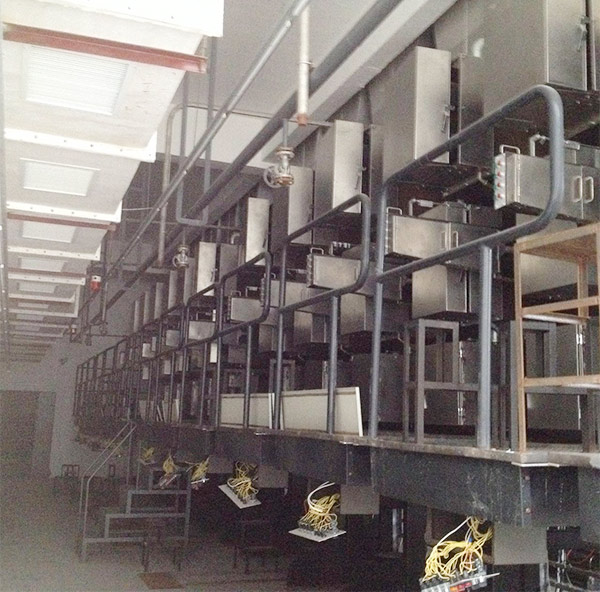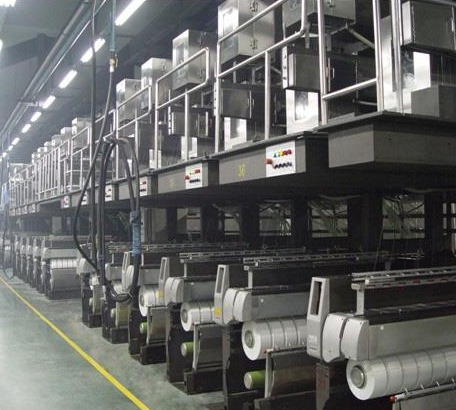- Polypropylene spinning machine
- Polypropylene FDY equipment
- Polyester POY spinning machine
- Polyamide FDY common and high strength equipment
- Polyester FDY equipment
- Polyester high strength equipment
- polyester、Polyamide、 Polypropylene BCF equipment
- Small spinning machine
- All kinds of spinning special parts
- Polypropylene spinning machine: The key to efficient production and diversified fiber manufacturing
- 【 Insight into Trends and Linking Opportunities 】 Fubon Machinery awaits you at the 2025 China Chemical Fiber Association Polypropylene Annual Conference!
- The International Forum on Seamless Knitting and the Theme Annual Conference of Zhejiang Seamless Weaving Industry Association were held
- Struggle writes the spring and autumn, diligence reveals the charm of craftsmanship | Fubang Machinery wishes everyone a happy May Day!
- The China (Shishi) International Textile and Apparel Expo and the National Fashion Textile and Apparel Supply Chain Exhibition kicked off
- Focus on six core modules to unlock new driving forces for the upgrading of the recycled fiber industry chain

- Contact:Mr. Huang Guofu
- Cel:0086-13901505556
- Fax:0086-519-83341119
- Email:czfb5556@126.com
- Add:No. 288-8 ChangLi Rd, Huangli Town, Changzhou, JS PRV.
Affected by the epidemic, the performance of the world's major luxury goods groups has experienced a collective decline. Kering, the world’s third-largest luxury goods group, which owns luxury brands such as Gucci and Saint Laurent, released its latest performance report for the first half of 2020, showing that the group’s revenue fell 29.6% year-on-year to approximately 5.378 billion euros during the period. Net profit fell 53% to 272.6 million euros. The Kering Group also stated that due to the lack of visibility in the overall luxury market, sales in the second half of the year cannot be predicted, and the second half of this year will not be able to make up for the loss of revenue in the first half of the year.
From a brand perspective, the performance of the Kering Group's brands has declined. Among them, the core brand, Gucci, which accounts for half of the sales, has dropped by 30% in the first half of the year. According to the financial report, Gucci’s second-quarter sales fell by 44.7%, first-half revenue fell by 33.5% to 3.072 billion euros, and operating profit was 929 million euros; SaintLaurent’s second-quarter sales fell 48.4%, and first-half revenue fell 30% to 681 million euros. Euro; BottegaVeneta's second-quarter sales fell 24.4%, and first-half revenue fell 8.4% to 503 million euros.
Due to the uncertainty of the market environment and the ongoing crisis of the epidemic, Kering Group does not expect to offset its revenue loss by the end of this year. Kering Group previously stated that due to the impact of the pneumonia epidemic, the group is preparing for the most difficult year. Related measures will include cutting costs for its brands and delaying new product launches.
Kering Group is not alone. Earlier, the world's largest luxury goods group LVMH Group reported that its net profit plunged 84% in the first half of the year. Financial report data show that in the six months ended June 30, LVMH sales fell to 18.393 billion euros, a decline of 28%, and net profit was only 522 million euros, a plunge of 84% from the same period last year. LVMH explained in the financial report that the decline in performance was mainly affected by the large-scale shutdown of the US and European businesses.
Cheng Weixiong, a clothing brand management expert and general manager of Shanghai Liangqi Brand Management Co., Ltd., analyzed that the normalization of the epidemic has spread in Europe and the United States, which has led to a reduction in consumer experience consumption in physical stores, which has dealt a greater blow to luxury goods groups .
Due to the decrease in physical store consumption, expanding online business is particularly important for luxury goods companies, but the effect of online business layout is not promising. Cheng Weixiong analyzed and pointed out that before the development of online business of luxury brands was generally more cautious. Under the impact of the epidemic, it was a bit late to make some online layouts. "In addition, there is still some understanding of the online and offline interconnection of luxury brands. Defects.” Shen Meng, executive director of Chanson Capital, also pointed out that the prospects for the development of luxury goods online business are not impressive. “Consumers pay more attention to the quality of service when buying in stores, and the unit price of luxury goods is high, and online sales are risky. ."
- The International Forum on Seamless Knitting and the Theme Annual Conference of Zhejiang S
- Polypropylene spinning machine: The key to efficient production and diversified fiber manu
- 【 Insight into Trends and Linking Opportunities 】 Fubon Machinery awaits you at the 2025 C
- Struggle writes the spring and autumn, diligence reveals the charm of craftsmanship | Fuba
- The China (Shishi) International Textile and Apparel Expo and the National Fashion Textile
- Focus on six core modules to unlock new driving forces for the upgrading of the recycled f
- Argentina has lifted anti-dumping duties. The Textile Association has taken measures to br
- Cotton textile industry fifteen five development guidance seminar was held in Anqing
- Explore the spinning machine: four functional areas, open the secret door of fiber product
- Manager must read | say goodbye to control management, release the potential of employees,




